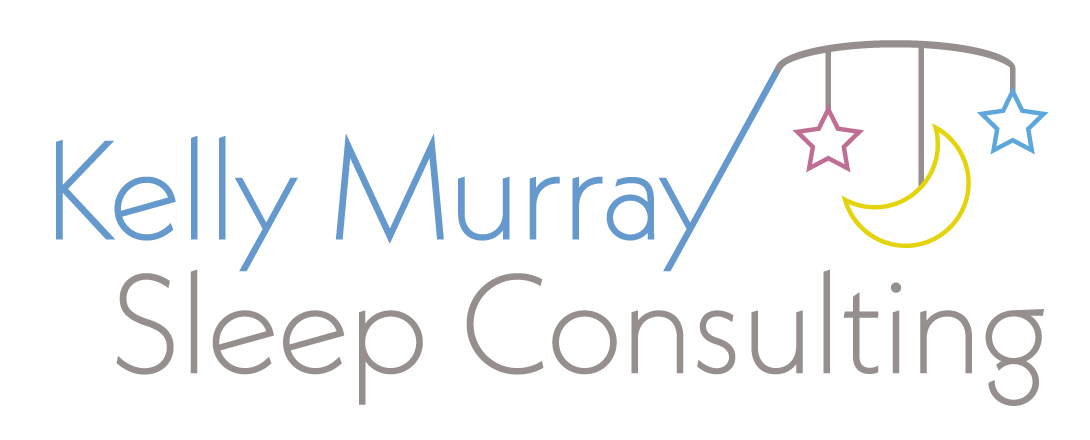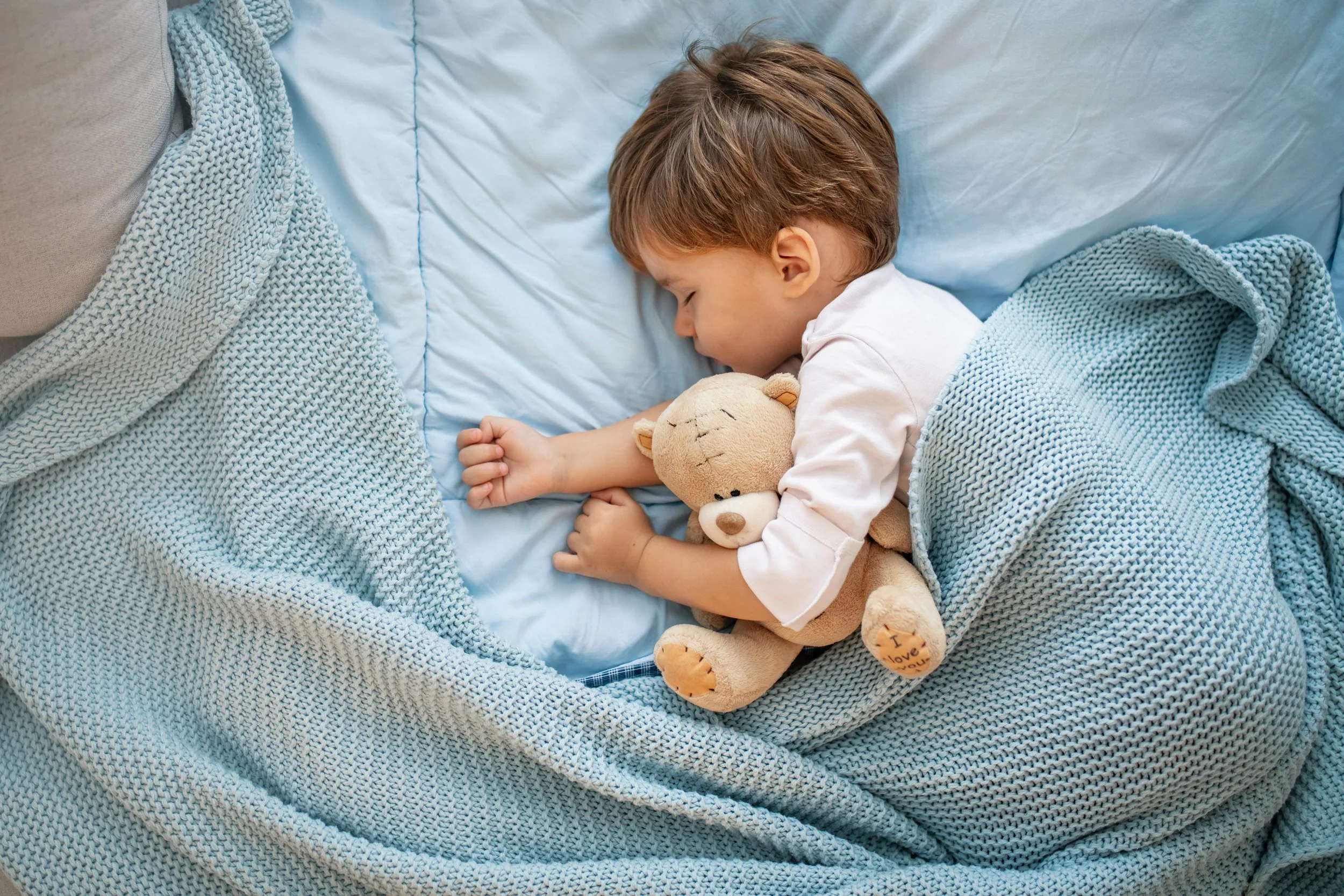It’s Time to Clear Something Up:
You do not have to stop feeding your baby overnight if you are going to sleep train.
Now that we’ve gotten that out of the way, let me explain why and how you can accomplish both — successfully!
Some babies still require a night feeding until they're eight months old — sometimes even a year! And that shouldn't hold you back from teaching your baby how to fall asleep independently if they're waking up multiple times per night and you're exhausted. The key is to teach your baby to distinguish feeding as something separate from the act of falling and staying asleep.
Let’s Start by Reviewing What Sleep Training Is
Sleep training is basically teaching your baby to fall asleep without a sleep prop
Sleep props are anything that goes missing overnight that you use to put your baby to sleep.
Sleep prop examples include:
Feeding your baby to sleep with breast or bottle
Rocking your baby to sleep
Holding your baby to sleep
Even the pacifier
How Sleep Props Interfere with Your Baby’s Sleep
They Wreak Havoc on Sleep Cycles
In the middle of the night, humans wake up about five times while we’re connecting sleep cycles. Starting at about four months old, our babies begin sleeping in cycles this way, too.
Sleep cycles are characterized by going from light sleep to deep sleep, and in between every cycle, there is a little tiny wake-up. During these wake-ups, we do an environmental scan to see if there's anything in our environment that is “off”, or different from they way it was when we fell asleep at the start of the evening. This is an instinctive, built-in protective mechanism, and our babies do it, too.
“What just happened?? Where am I??”
When your baby is rocked to sleep or falls asleep with their pacifier in their mouth, this tiny wake-up turns into major alarm bells. Your baby expects to be in your arms because when they fell asleep, they were in your arms! Or they expect their pacifier to be in their mouth because when they fell asleep, the pacifier was in their mouth! But all of a sudden, they're now in their crib — alone — and there’s no mom or dad, there’s no pacifier, and this triggers a major physical alarm system in the body. They’re thinking, “What happened? The last thing I remember I was in my mom's arms and now I'm in my crib all by myself! AHH! Help!" Then, they're not able to fall back to sleep because they don't know how to fall asleep independently — because you used a prop to help them to fall asleep in the first place.
Removing the Props Removes the Alarm
By teaching your baby to fall asleep on their own without props, they become able to connect sleep cycles on their own because their environment now remains consistent overnight. You remove any cause for alarm during those little arousals and your baby learns to connect the sleep cycle and fall right back to sleep on their own.
Distinguishing the Difference Between Needing to Feed and When Feeding Is a Prop
I think that myth exists that you have to stop feeding overnight if you're going to sleep train because the fear is that feeding will remain a prop. However, what I usually find is that, once a baby learns to fall asleep without the feeding-to-sleep association (prop), then they typically only wake up overnight if they need the feed. I find that a lot of babies typically will start to sleep 11-12 hours without waking up for a feed at all once that prop association is gone.
So, if your baby is sleep trained and still wakes up to feed once or twice, that's totally fine! I encourage you to continue to feed your baby because they obviously need the nutrition!
However, if you did sleep train and you’re finding your baby is waking up more than once or twice per night, or when your baby does wake up, they're not taking a full feed and you can tell they're just feeding to fall back to sleep, I would make sure that you're doing the following:
You're waiting a good 5-10 minutes before you go into the room to feed
Don't assume just because they're awake that they need a feed. Even though you sleep trained and taught your baby to fall asleep independently overnight, they're still going to wake up in between sleep cycles sometimes. Research shows that sometimes it can take up to 10 minutes for them to fall back to sleep, so make sure you're giving your baby the opportunity to fall back to sleep on their own.
Make sure when you do feed, you're not feeding them back to sleep
If you are feeding your baby back to sleep, then they're going to maintain this feeding-to-sleep association. If your baby starts to fall asleep during the feed, prop them up and burp them and stop the feed.
Baby Waking Up Excessively Overnight and You Know They Can Do Better and You Haven’t Sleep Trained?
Try This:
If your baby is waking up excessively overnight and you know they can do better and you haven't done sleep training yet, I encourage you to check out my blog "What the heck is sleep training anyway?" It explains the different methods of sleep training and will give you a good idea of what method may be best for your family.
If you find that you're leaning more towards the Stay In The Room Method (also sometimes called the Chair Method), or the Graduated Extinction Method, which I call Out of The Room Method, and you need assistance, we can help.
I now offer a digital course The Art and Science of Sleep Training — a budget-friendly way to get sleep training guidance. Or, you can also work with me or one of my sleep consultants one-on-one if you're looking for a more tailored approach.
You Got This
I hope that this blog post has helped to clear up the common misconception that you have to drop the overnight feeds in order to sleep train.
If you feel like your baby still needs to feed overnight but you want to get rid of some of those night wakings, I would definitely encourage you to sleep train.
It makes all the difference in the world.
LET’S GET YOU TUCKED IN
Book a 15-minute sleep evaluation today. We’ll chat about your current situation and how my program could benefit you.
Sweet Dreams…
Kelly Murray is a certified sleep coach and an award-winning pediatric sleep consultant based in Chicago offering sleep coaching services nationwide.
















